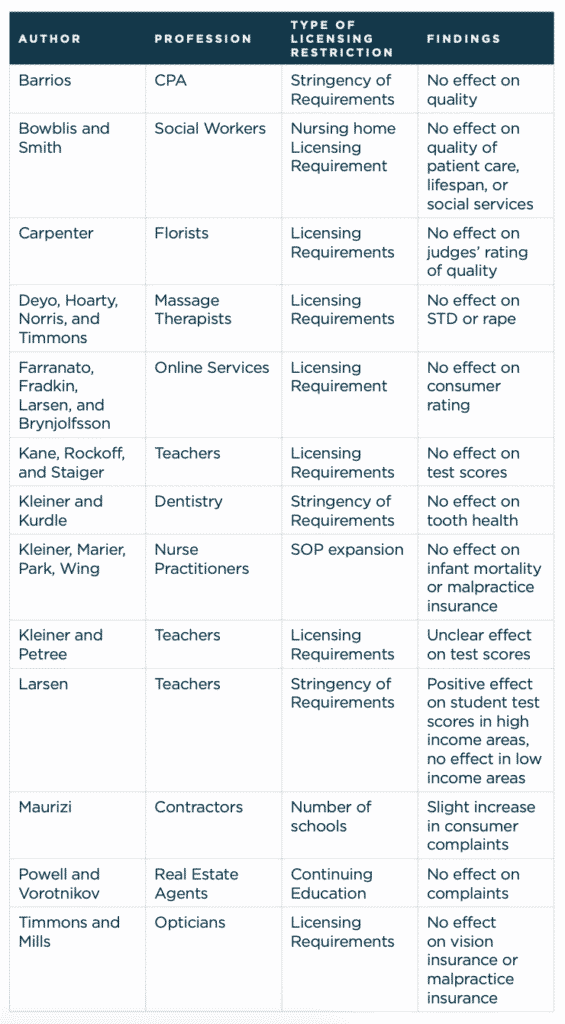Despite the costs associated with occupational licensing, it still may be the appropriate level of regulation. Occupational licensing exists to ensure quality of service and protect health and safety. In some cases, the benefits of properly designed licensing regulations may outweigh the costs. But any analysis will require an estimation of the effect of licensing on quality and safety.
Occupational licensing has become the standard form of professional regulation, but policymakers need to consider the costs and the benefits to determine the proper level of regulation and whether less restrictive alternatives would be more appropriate.
A number of studies have examined the effects of occupational licensing laws. Quality can be difficult to measure for many services, so the professions covered are limited. On the whole, there is little evidence that occupational licensing improves the quality of services or protects the public health and safety. The chart below summarizes the literature on occupational licensing and quality since 1980. Only one piece finds evidence that licensing has a positive effect on quality.

According to the Federal Trade Commission, “Occupational regulation can be especially problematic when regulatory authority is delegated to a board controlled by active market participants,” which is precisely what occurs under occupational licensing as currently designed. Members of the regulatory authority, the licensing board, are almost exclusively composed of members of the profession in that field. Some expertise is warranted. For instance, some knowledge of medicine is necessary for members of the medical board to design appropriate standards. However, having members with a financial interest in the regulation and enforcement actions of the board will likely result in self-serving decisions, ones that protect professionals rather than the public, even if the board members are well meaning.
Licensing boards can adjust licensing standards, making them more onerous. For instance, boards have been found to adjust the pass rates of licensing exams in response to a larger pool of applicants. This allows them to directly limit the size of the profession, increasing their wages. Additionally, they can use the state legislature to limit competition. State professional associations, especially those backed by the legitimacy of a licensed profession, are in a good position to lobby legislatures. Each member of a licensed profession stands to gain much more than a member of the public from increasing requirements. Thus, professionals have a greater interest in applying political pressure. One of the most important factors determining whether a profession is licensed is the degree of political influence the profession places on the legislature.
While boards are designed to ensure quality through the monitoring of professionals, they often fail to live up to this purpose. Boards often do not directly observe professionals, instead relying on complaints from the public. Of these complaints, only a small fraction are investigated and result in disciplinary action.
There are also cases where occupational licensing can cause quality to deteriorate or make consumers less safe. Because occupational licensing increases the costs of services, some consumers are forced to go without. Others will perform the tasks themselves, or have an unlicensed friend perform them. For instance, in places where licensing reduces the number of journeyman electricians offering their services, the number of electrocutions is higher. Thus, we have evidence that licensing can reduce quality by forcing consumers to perform services themselves. In a similar estimation for plumbers, they found that in locations with fewer plumbers, there were higher retail sales of plumbing supplies per house. This suggests that again, individuals are performing plumbing services themselves, with the assumption that the services will be lower quality than from a professional plumber.
More stringent licensing standards for real estate brokers are associated with inferior service (longer times to sell properties) in rural areas. This suggests that in situations where licensing standards cause a large shortage, the shortage can cause quality deterioration, the exact opposite of the purpose of licensing.
There is also growing evidence that the public does not care about licensing status when they have access to other information about service providers. With the growth of peer-to-peer rating websites, consumers now have access to much more detailed information about professionals. Recent research has examined how much consumers weigh licensing status compared to reviews from past consumers. Using data from an online platform for residential home services, they find that licensing status has no impact on consumers’ decisionmaking process. Rather, consumers largely based their decisions on the service provider’s review rating and prices.
In a poll of consumers from the platform, only 61 percent knew the licensing status of their professional, and most consumers learned about licensing status when signing the contract, not while reaching the decision to offer the job to that contractor.
You can help reform occupational regulations. Please sign the petition below.
(function(d, s, id) {
var js, fjs = d.getElementsByTagName(s)[0];
if (d.getElementById(id)) return;
js = d.createElement(s); js.id = id;
js.src = ‘//p2a.co/js/embed/widget/advocacywidget.min.js’;
fjs.parentNode.insertBefore(js, fjs);
}(document, ‘script’, ‘advocacy-actionwidget-code’));

